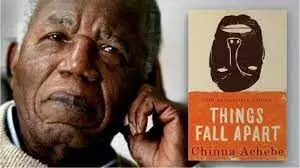- Home
- /
- Trending-News
- /
- Things Fall Apart...
Things Fall Apart still tells African history 65 years after – Don

Dr Akil Khalfani, Pan African Diaspora Ambassador to the Ooni of Ife, says the Nigerian novel, Things Fall Apart, is still valued after 65 years because it tells the story of African history, culture and family.
Khalfani, Director, Africana Institute, Essex County College, Newark, New Jersey, said this in an interview in New York.
Khalfani, also the director, Center for Global Education and Experience, spoke against the backdrop of the 65th anniversary of Things Fall Apart, which was first published in 1958, by William Heinemann, London.
“The value of Things Fall Apart is that it tells the story of the impact of white supremacy and before that, it tells the story of African history, culture and family,’’ he said.
Things Fall Apart, Chinua Achebe’s debut novel, and his two other classics, Arrow of God and No Longer at Ease, are called the “African Trilogy” in literature and considered requisite reading for anyone choosing African literature as an area of specialization.
Khalfani described Achebe as a visionary author, who could put what he saw down six decades ago about the dominance of western culture over African culture.
“We need to understand what were the experiences that helped him to understand the reason for the piece because African people still feel the impact today. It touches the heart and the spirit of people.
“It talks about African tradition, and it is a note to us today to say don’t let others intrude, once they begin to intrude on your culture, that might be the beginning of losing it,’’ he said.
Khalfani cited the example of when the missionaries came to Africa and that it was the precursor to undermining the African culture and people.
“If we are not the caretakers of our own culture, then somebody else is going to distort it and use it against us.
“So, our history and culture have been studied by Europeans and other folks, and they’ve used it to their advantage and to our disadvantage.
“And then we want to cast away our own history and culture and adopt theirs; that is what we see a lot of times,’’ he said.
He, however, encouraged Africans in the diaspora to embrace their culture by identifying with the dresses, names, foods and African music.
The don also commended the Consulate General of Nigeria in New York for organsing “Ayan Atayero Festival” (Festival of Drums), to promote the understanding and appreciation of Nigeria’s rich culture and heritage in the U.S.
The maiden edition of the festival was held on August 3 at Nigeria House in New York in collaboration with the House of Oduduwa and the Atayero of Aramoko Kingdom, Ekiti.
“The event was a beautiful opportunity for us to see and experience the richness in drumming like Gangan (talking drum), Bata Drums and other drums.
“These two drums in particular help us to understand the language of the drum.
“I was talking to “Kabiyesi” (Ooni of Ife) on the need to bring them to the College in New Jersey so that we can have the opportunity to really make those connections.
“I think an event like this gives us the opportunity to find ways to connect between our different African experiences,’’ he said.
Khalfani, who praised African culture, said that people would want to draw lines between our differences and similarities, saying event of such nature should also help to highlight our similarities and differences.
The don said Africans had a lot of things to celebrate, drawing from their similarities in food, culture and music, adding that the people can also celebrate their differences, instead of letting those cause conflict and tension.
“We can celebrate them; we have Jollof rice in Senegal, Ghana and Nigeria. We have different spiritual and cultural traditions in those three countries.
“Also, we can bring drums from those countries and celebrate them. Even in Nigeria, we can look at drumming culture of the Igbos, Hausas and the Yourbas and celebrate them.
“What are the drumming systems of the Ibo? What are those different ways in which they drum and communicate, like it’s libations, the Yoruba uses, alcohol while the Ibos use common kolanut.
“So that’s the key. We just have a different tool and a different modality of doing so there is the need to bring those different drums together and celebrate them and have each one performed,’’ he said.



